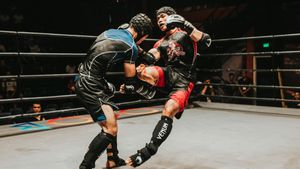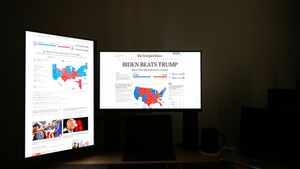DAKAR, Senegal (AP) — The M23 rebel group, backed by Rwanda, has dramatically escalated tensions in eastern Congo by capturing the strategic city of Goma, which lies at the heart of one of Africa's longest-running conflicts. Goma, home to over 2 million people and situated on the Congo-Rwanda border, now serves as the center of this volatile situation, putting millions of residents at risk of humanitarian catastrophe.
The rebels, primarily made up of ethnic Tutsis, have expanded their presence since taking Goma earlier this week, claiming they aim to march on the Congolese capital of Kinshasa, nearly 1,000 miles away. Their actions come amid deepening concerns over humanitarian conditions, with over two million civilians, including one million already displaced, facing potential catastrophic outcomes due to the violence, according to aid groups.
The situation has prompted widespread condemnation from international communities, particularly the United Nations (U.N.), which has reported serious human rights violations including executions and sexual violence perpetrated by the rebels. Hospitals are overwhelmed, with reports of more than 2,000 injuries stemming from the fighting. "There is no doubt, the humanitarian situation is worsening," said World Health Organization representatives following assessments conducted with the Congolese government.
The M23 group's resurgence serves as a reminder of the region's troubled past, rooted deeply in the aftermath of the 1994 Rwandan genocide. This armed faction, which took its name from the March 23, 2009 peace agreement it accuses the Congolese government of violating, has returned to prominence after lying dormant for nearly ten years. Their claim of fighting solely for the welfare of Congolese people, rather than for the abundant mineral wealth of eastern Congo, has been met with skepticism by many observers.
Corneille Nangaa, one of the M23 leaders, asserts, "Our objective is Congo; we are fighting for Congo. We are not fighting for minerals, we are not fighting for anything (else)." This assertion, nonetheless, is cast against the backdrop of eastern Congo's staggering mineral wealth which includes cobalt, copper, lithium, and gold—valued at over $24 trillion, according to U.S. Commerce Department estimates.
Analysts have pointed out the varying motivations among different groups operating within Congo, emphasizing the strategic importance of controlling mineral-rich territories. The reality remains grim, with almost 60% of the Congolese population living below the poverty line even as nations like the U.S. and China increasingly seek access to the region's resources.
Rwanda's involvement has been particularly controversial. The DRC government and U.N. experts have accused Rwanda of providing military support to the M23. Although Rwanda denies these allegations, it has acknowledged the presence of its troops and missile systems within eastern Congo, claiming to protect its security interests. A report by the U.N. estimates up to 4,000 Rwandan forces operating within Congo's borders, significantly more than during the M23's previous incursion in 2012.
Leaders from the Southern African Development Community (SADC) have expressed unwavering solidarity with the DRC, condemning Rwandan influence and aggression. They held crisis talks, promising support for the DRC's defense and calling for immediate diplomatic action.
The humanitarian impact of the heightened conflict has been severe. The World Health Organization reported 700 deaths and over 2,800 injuries from the recent escalation. Concurrently, 4 million people across eastern Congo have been displaced, many of whom are now living without proper access to food, water, or healthcare. Two camps for internally displaced persons have been bombed, with aid organizations unable to provide assistance as roads remain blocked and medical facilities struggle to cope with the influx of casualties.
The capture of Goma also revived fears of regional destabilization. Observers worry this could ignite similar chaos to what transpired during the Congo Wars of the 1990s, which left millions dead and ravaged the region's social and political fabric. Historical grievances dating back to the genocide and formative conflicts continue to fuel distrust between ethnic groups.
Despite its military gains, the M23 rebels are now confronted with the challenge of maintaining control over Goma and potentially moving toward Bukavu, another significant urban center just 60 kilometers away, noted UN Under-Secretary-General for Peace Operations Jean-Pierre Lacroix. The presence of thousands of displaced people weighs heavily on its environment and resources.
President Félix Tshisekedi vowed to reclaim Goma and maintain the country's territorial integrity, emphasizing the government’s determination to resist rebel advances. “We will fight and we will triumph,” he declared. The Congolese military has begun mobilizing additional troops following Tshisekedi's call to arms, with young volunteers stepping forward to join the fight against M23 rebels.
International response has been muted, especially compared to reactions during the 2012 capture of Goma, as countries focus on other global crises. Ben Shepherd, from Chatham House, described the complexity of current diplomatic efforts: “Significantly less international pressure exists now than back then, influenced by shifting geopolitical priorities and Rwanda’s appealing post-genocide narrative.”
The need for urgent humanitarian action has never been more pressing. Aid agencies call for access to populations stranded by conflict. Goma, once viewed as a humanitarian hub, now faces enormous challenges, with resources dwindling and the civilian population trapped amid the chaos.
With Goma firmly under M23 control, analysts fear for the future stability of the wider region and the effective response to human suffering. The international community must reassess its strategies toward both the DRC and Rwanda to address the underlying causes of conflict and begin healing deep-seated wounds affecting millions.



